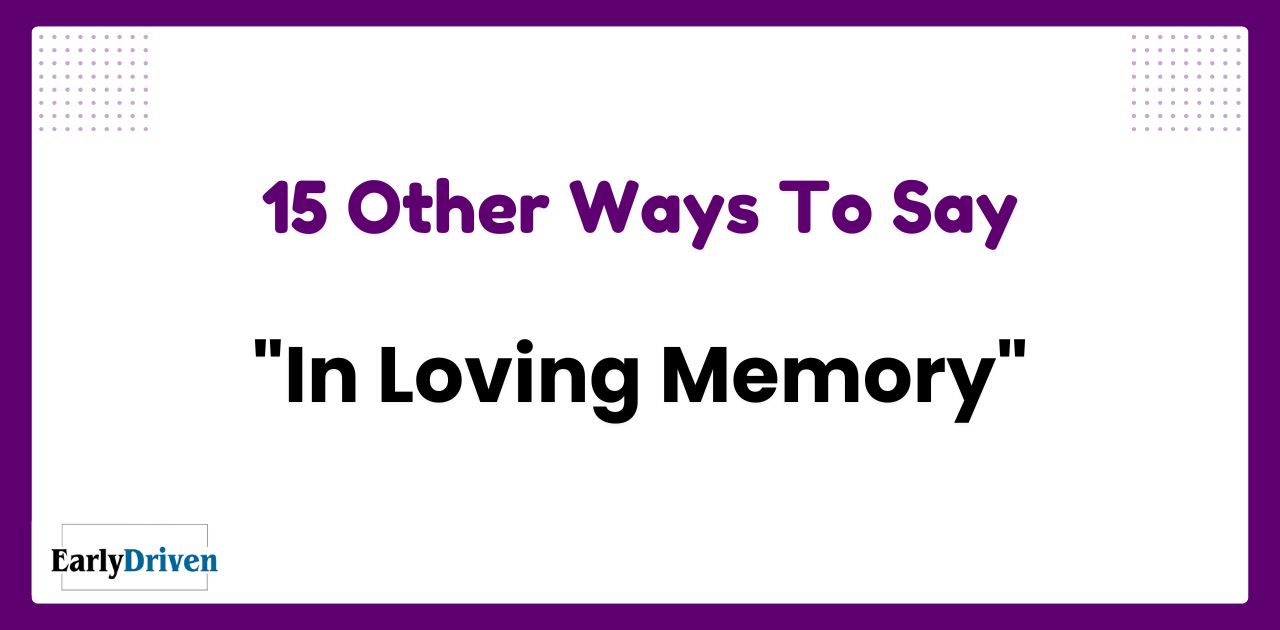Finding the right words to honor someone who has passed away is one of life’s most delicate and meaningful tasks. Whether crafting an obituary, designing a memorial plaque, or preparing a tribute message, the traditional phrase “in loving memory” may not always fully capture the depth of emotion and remembrance we wish to convey.
This comprehensive guide explores fifteen thoughtful alternatives to this common memorial expression, providing detailed examples and guidance for their appropriate use in various contexts. From formal dedications to intimate personal tributes, these carefully chosen phrases will help you express your sentiments with grace, dignity, and deep respect for your loved one’s legacy.
Understanding the Purpose of Ways to Say “In Loving Memory”
The phrase “in loving memory” carries profound significance in how we honor and remember those who have passed away. This traditional expression, while beautiful, sometimes needs alternatives that can better capture the unique relationship we shared with our departed loved ones. Whether for obituaries, memorial services, or tribute messages, choosing the right words helps preserve legacies and comfort those who remain.
In today’s diverse society, having multiple ways to express remembrance allows us to personalize our tributes while maintaining the dignity and respect these occasions demand. These alternatives can serve various purposes, from formal memorial dedications to intimate personal tributes.
Other Ways to Say “In Loving Memory”
- In Remembrance of
- Always Remembered
- A Memory Eternal
- Forever in Our Hearts
- Eternally Cherished
- In Memoriam
- Remembered with Love
- Gone but Not Forgotten
- In Fond Memory
- Cherished in Memory
- Forever Missed
- Treasured Memories
- A Legacy Remembered
- In Tribute to
- With Loving Tribute
1. In Remembrance of
This dignified phrase serves as a formal yet heartfelt way to honor someone’s memory. It’s particularly effective for memorial services and official dedications.
Example: “In remembrance of Dr. Sarah Chen, whose groundbreaking research and compassionate patient care transformed countless lives at Memorial Hospital.”
2. Always Remembered
This phrase emphasizes the lasting impact of the deceased person’s life and our commitment to keeping their memory alive.
Example: “James Wilson, always remembered for his infectious laughter and unwavering dedication to community service, 1945-2024.”
3. A Memory Eternal
This profound expression suggests that the person’s influence transcends their physical presence, making it ideal for spiritual or religious contexts.
Example: “A memory eternal: Father Michael O’Brien, whose wisdom continues to guide our congregation’s path forward.”
4. Forever in Our Hearts
This intimate phrase conveys ongoing love and connection, perfect for personal tributes and family memorials.
Example: “Forever in our hearts – Our beloved grandmother Maria, whose kitchen was always open and whose love knew no bounds.”
5. Eternally Cherished
This expression combines deep affection with permanence, suitable for both formal and personal remembrances.
Example: “Eternally cherished – David Thompson, whose music brought joy to three generations of students.”
6. In Memoriam
This timeless Latin phrase carries gravitas and formality, making it particularly suitable for scholarly dedications and formal remembrances.
Example: “In memoriam: Professor Robert Hughes, whose pioneering research in quantum physics shaped our understanding of the universe, leaving an indelible mark on science.”
7. Remembered with Love
This warm expression balances formality with emotional depth, perfect for memorial programs and personal tributes.
Example: “Remembered with love – Emma Martinez, whose volunteer work at the children’s hospital brought light to the darkest days.”
Read Also: 15 Other Ways to Say “Family Emergency”
8. Gone but Not Forgotten
This powerful phrase acknowledges loss while affirming lasting impact, ideal for epitaphs and remembrance messages.
Example: “Gone but not forgotten – Officer John Reynolds, whose twenty years of service made our streets safer and our community stronger.”
9. In Fond Memory
This gentle phrase emphasizes pleasant recollections and positive legacy, suitable for condolence messages and memorial gatherings.
Example: “In fond memory of Elizabeth Baker, whose garden club transformed our neighborhood into a paradise of blooming flowers.”
10. Cherished in Memory
This heartfelt expression combines deep appreciation with lasting remembrance, perfect for personal messages and family tributes.
Example: “Cherished in memory – Our dear friend Thomas Anderson, whose Sunday dinners brought together friends and strangers alike, creating a community of love.”
11. Forever Missed
This poignant phrase acknowledges the ongoing impact of loss while expressing enduring affection.
Example: “Forever missed – Katherine Wong, whose leadership at the youth center inspired a generation of young entrepreneurs.”
12. Treasured Memories
This warm expression focuses on the positive legacy and lasting impact of the deceased.
Example: “Treasured memories of William Foster, whose storytelling captivated audiences and preserved our town’s history.”
13. A Legacy Remembered
This phrase emphasizes the lasting contributions and influence of the departed, ideal for commemorative language and professional tributes.
Example: “A legacy remembered – Dr. Patricia Moore, whose groundbreaking environmental research continues to influence conservation efforts worldwide.”
14. In Tribute to
This formal yet versatile phrase works well for public acknowledgments and dedications.
Example: “In tribute to Marcus Johnson, whose architectural vision transformed our city’s skyline while preserving its historic charm.”
15. With Loving Tribute
This comprehensive phrase combines respect with deep affection, suitable for various memorial contexts.
Example: “With loving tribute to Mary Sullivan, whose forty years of teaching shaped not just minds but hearts in our community.”
Best Practices for Memorial Expressions
When choosing and using memorial phrases, consider these essential guidelines:
- Consider the Context
- Match the formality level to the setting
- Respect cultural and religious considerations
- Account for the relationship to the deceased
- Personalization
- Include specific details about the person’s life
- Reference their unique contributions
- Incorporate personal qualities or achievements
- Timing and Placement
- Choose appropriate expressions for different memorial materials
- Consider the audience and venue
- Maintain consistency across different memorial items
Common Scenarios and Applications
Formal Occasions
- Obituaries: Use more formal phrases like “In Memoriam” or “In Remembrance of”
- Memorial Services: Combine formal and personal expressions
- Public Dedications: Choose dignified, lasting expressions
Personal Tributes
- Family Messages: Use warm, intimate phrases
- Social Media Posts: Balance respect with accessibility
- Private Memorials: Focus on personal connection
Read Also: 15 Other Ways to Say “I Hope Everything Is Going Well With You”
FAQ’s
Q: How do I choose the most appropriate memorial phrase?
A: Consider your relationship with the deceased, the context of the memorial, and the audience who will see it. Personal tributes can be more intimate, while public memorials often require more formal language.
Q: Is it appropriate to customize these phrases?
A: Yes, thoughtful customization can make the tribute more meaningful. Add specific details about the person’s life, character, or impact while maintaining respect and dignity.
Q: How can I make the tribute more personal while staying respectful?
A: Incorporate specific memories, qualities, or achievements of the deceased while maintaining appropriate tone and language for the context.
Q: What is the correct way to use “in loving memory” versus “in loving memories”?
A: “In loving memory” is the correct singular form, as it refers to the collective remembrance of someone who has passed. While “memories” is appropriate when discussing specific recollections, the memorial phrase should use the singular “memory.”
Q: What are appropriate alternatives to “in loving memory”?
A: Several dignified alternatives include “Forever in Our Hearts,” “In Remembrance of,” “Eternally Cherished,” and “A Legacy Remembered.” The choice depends on the context and relationship with the deceased.
Q: How do you write a meaningful memorial message?
A: Craft a memorial message by combining a thoughtful opening phrase with specific details about the person’s character, achievements, or impact on others. Focus on authentic qualities that made them special and include a personal memory or tribute to their legacy.
Q: What is the difference between “in memory of” and “in memoriam”?
A: “In memory of” is a more casual, versatile English phrase suitable for various contexts, while “in memoriam” is a formal Latin phrase often used in official or published tributes. Both are correct, but “in memoriam” carries more gravitas.
Q: How can you best honor someone’s memory through words?
A: Honor someone’s memory by sharing specific stories that highlight their character, describing their positive impact on others, and expressing how their legacy continues to influence people today. Focus on authentic, personal details rather than generic praise.
Q: What makes an effective remembrance message?
A: An effective remembrance message combines sincere emotion with specific details about the person, their life, and their impact. It should be respectful, personal, and appropriate for the intended audience and context.
Q: How do you choose the most appropriate memorial phrase for different situations?
A: Select a memorial phrase based on the formality of the occasion, your relationship with the deceased, and the intended audience. Consider whether the context is public or private, formal or intimate, and choose accordingly.
Conclusion
Choosing the right way to express remembrance is a deeply personal yet universally important task. These fifteen alternatives to “in loving memory” offer various ways to honor departed loved ones while maintaining dignity and expressing genuine sentiment. Whether for formal memorial dedications or intimate personal tributes, these phrases help us articulate our lasting respect and affection for those we’ve lost.
Remember that the most meaningful tributes often combine carefully chosen words with specific memories and acknowledgments of the person’s unique impact. By thoughtfully selecting and personalizing these expressions, we can create lasting memorials that truly honor our loved ones’ legacies.
Elevate you English Learning Skills with our Mastery Blogs!

“Smith, At EarlyDriven, our dedicated team of experienced writers and journalists brings you comprehensive coverage across entertainment, celebrity news, and educational content. With expertise in digital media and a commitment to accuracy, we craft engaging stories that inform, educate, and entertain our global readership.










